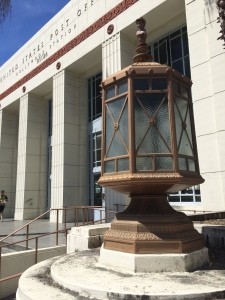
Well, Judge Michael W. Fitzgerald of the U.S. District Court for the Central District of California (that’s federalese for “Los Angeles”) not only dismissed Inglewood’s case, he terminated it with extreme prejudice. You can read the order here if you wish, and it’s smoking hot. The salient bit for this blog is, according to Volokh, that:
The court held that, under California law (see, e.g., County of Santa Clara v. Superior Court (Cal. Ct. App. 2009)), cities can’t claim copyright in public records. And while the city claims that this provision is trumped by federal copyright law, the court rejected that argument — federal law treats local governments as political subdivisions of the state, and a state has the power to control what its subdivisions do (including which federal rights they claim).
Now, I can hear you all murmuring and wondering out there in internetlandia, saying “sure, Kohlhaas, we hear you, but what does this got to do with the BIDs??!” Well, friends, we’re glad you asked!
First, check out the HPOA’s terms of use for their website. They assert copyright most vigorously, although, weirdly, they don’t seem to know how to make a © in html:

The material contained in the Web site is Copyright (C) 2015 the HPOA. It is provided for the private informational use of the Web site’s users only. Its text, data, photos, graphics, audio and/or video material or any portion thereof may not be stored in a computer, published, rewritten for broadcast or publication or redistributed in any medium.
And as if asserting copyright weren’t enough of a threat, they have even more threats piled up on top of it:
The HPOA may terminate or block any user’s access to the Web site at any time, with or without notice, for any violation of these Terms of Use.
It’s downright frightening. Now, I can still hear you all murmuring and wondering out there in internetlandia, and now you’re saying “sure, Kohlhaas, we hear you, but what does this got to do with the court case??!? After all, the BIDs ain’t city agencies!1!”

SECTION 14. CORPORATION NOT AGENT OF CITY
Neither Corporation or any of Corporation’s employees, agents, representatives, or subcontractors are or shall be considered to be agents of City, nor shall Corporation be considered a legislative body, relative to the performance of Corporation’s obligations under this Agreement or for any other purpose.
And that would seem to say that Hizzoner’s decision in the Inglewood case just doesn’t apply, since it relies on California municipalities (and their agents) being subdivisions of the state, but the contract that BIDs sign with the city says flat-out that whatever BIDs are, they aren’t that. Now, we’re not lawyers around here, at least most of us aren’t, but we do know that just because some people put some stuff in a contract and sign it, that don’t make it true. In fact, two parties to a contract can put anything they want in there and, as long as they continue on amicable terms, no one can say anything about it. Contracting parties can, e.g., agree in writing that they’re all Martian invaders but will continue to wear latex disguises so that they may pass for Earthlings during the term of the contract. Contracting parties can agree in writing that they will use alchemical procedures to turn human shit into purest gold at the rate of 52 kilos per annum and twice that in leap years during the term of the contract. As long as the contract stays out of a court of law such clauses are perfectly acceptable.
And, as long-time readers of this blog may recall, this very question has been litigated, and not just litigated between random parties, but litigated against our beloved HPOA itself! The case made it up to the California court of appeal, which, in its mind-blowing opinion Epstein v. Hollywood Entertainment District II Business Improvement District, declared most dispositively that:

The POA’s status as an entity originally “created” to take over City’s legislative functions was not somehow negated, annulled, or dissipated simply because its role subsequently was expanded by the geographic expansion of the area over which it exercised such functions. Nor do any of the reasons advanced by defendants justify exempting the POA from the same application of the Brown Act as would apply to City’s legislative body. We therefore conclude that the POA is a legislative body within the meaning of the Brown Act, that its actions must be taken in compliance with that Act, and that the trial erred by denying plaintiff’s motion for a preliminary injunction.
Smack! So that clause in the BID’s contract with the city was void, is void, and shall be void for ever more. It’s in the contract because both the city and the BIDs are liars. The court of appeal has spoken and it has declared that, for purposes of the Brown Act (and therefore for purposes of the Public Records Act), BIDs are in fact legislative bodies. So, yeah, the conclusion is that they don’t get to assert copyright in the public records they produce. They not only should have known this, but they almost certainly did know it, and yet they went ahead and put all that jibber-jabber about copyright and sanctions and blocking users for violating the TOU and stuff on their website when it’s all just empty threats, a tale told by an idiot, full of sound and fury, signifying nothing. They did it because they’re liars. Of course, one gets used to that from these people. Sheesh…
- If you look in the metadata of that last photo you will see, in addition to the fact that, like Paul Simon, Gary Leonard has a Nikon Camera and loves to take photographs, he (Gary, not Paul) asserts a copyright in the image:
Byline : Gary Leonard
City : Los Angeles
State : CA
Country : USA
(C)Notice : ©2013Gary LeonardSo who’s right amongst these dueling copyrights? We don’t know, but we suppose it doesn’t matter, since, although we said we weren’t going to do it, we’ve clearly commented enough on this to make what we’re willing to bet is a pretty rock-solid fair-use case in this particular instance.
Image of the judge is public domain because of the federal reasons. We got our copy from the usual suspects. The other images appear on the HPOA website, the HPOA claims that they hold the copyright to all of them, the Judge says they can’t assert copyrights on public records, so we’ve put them here for the same reason a dog licks himself.

As you have previously published information about this case, I thought I’d update you on Judge Michael Fitzgerald’s recent 10-8-15 opinion/ruling.
The Judge awarded attorney fees to my legal team in the amount of over $117,000.00 and most damning to Mayor James Butts and his Council of Yes-men is Judge Fitzgerald’s opinion that the Council’s complaints were “objectively unreasonable” and that the City’s case “posed a serious threat to critical political expression,…” The Judge opined that he was “not persuaded” by the Council’s claim that they brought suit only to protect their financial interests, and that “…the City’s most plausible purpose was to stifle Defendant’s political speech after he harshly criticized the City’s elected officials.”
In closing, the Judge stated that awarding attorney fees to my legal team, “…will serve to deter other entities, whether public or private, that contemplate bringing unreasonable suits to pressure an individual into abandoning a protected activity.
I have linked a copy of the Order.
https://assets.documentcloud.org/documents/2454231/inglewood-v-teixeira-order-on-attorneys-fees-how.txt
Thanks for the update, JT. We’re all big fans of your work here at MK.org. Congratulations on your huge win and on the fee award. This decision will have ramifications far beyond your particular case. Mazel tov to you and your legal team!